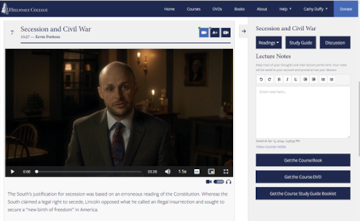Hillsdale College’s free Constitution 101 course consists of video lectures with supplementary reading and quizzes. The course is based on belief in foundational, unchanging principles, such as natural rights inherent to all people, the importance of limited government, and the need for the consent of the governed. The viewpoint is conservative and patriotic; at the end of the first lecture, Dr. Larry P. Arnn makes an editorial point that we need to restore the authority of the Constitution and the Declaration of Independence. The course directly challenges progressive ideas in modules with titles such as “The Progressive Rejection of the Founding” and “Post-Sixties Liberalism and Contemporary Politics.”
The course is presented in 12 modules. For eleven of the twelve modules, one primary video runs 24 to 40 minutes, and two supplementary videos each run a few minutes. The twelfth module has just one video that runs for seven minutes. The supplementary videos address narrow questions such as “Were the Anti-Federalists right in their objection to the Constitution?” and “Why wasn’t the Bill of Rights included in the original Constitution?” (from modules 3 and 4, respectively). Eleven of the modules conclude with an online multiple-choice quiz.
The lectures are presented by Larry P. Arnn, Thomas G. West, Ronald J. Pestritto, Kevin Portteus, and John W. Grant. All the presenters are excellent, and their lectures build on one another in a logical fashion rather than standing as independent topics.
An online study guide lays out the complete course with suggested readings (linked online or downloadable as a PDF book), detailed outlines of the lectures, terms and their definitions, key quotes from the lectures or reading material, and discussion questions. (You can get a printed copy of the study guide for a donation of $25 or more. For a donation of $100 or more, you can get a printed copy of the 808-page The U.S. Constitution: A Reader, which has the course readings.)
The suggested readings for the first module are The Declaration of Independence, The Constitution of the United States, and “Fragment on the Constitution and the Union,” written by Abraham Lincoln in 1861. Readings for other modules are from The Federalist Papers, the Virginia Declaration of Rights, The Northwest Ordinance, excerpts from books (e.g., Liberalism and Social Action by John Dewey), and many essays, letters, and speeches by figures such as Abraham Lincoln, Franklin D. Roosevelt, and Woodrow Wilson. Many are just a few pages long, but a few, such as the Constitution, will take longer to read.
The lecture presenters discuss the ideas that shaped our country, as well as those of progressives that challenge the foundational ideas of the Constitution and the Declaration of Independence. An essential question addressed by this course is whether our form of government, as outlined in the Constitution and the Declaration of Independence, depends upon unchanging principles or if shifting beliefs and values should cause us to rewrite or ignore the Constitution. The course’s answer is resounding support for the original intent of both documents.
The course raises major philosophical questions that should be great for research, debate, and discussion; the student’s available time and the class setting (e.g., a group class or independent study) will dictate what is possible. Students can simply watch the videos as part of a more comprehensive course on government. But the readings and discussion questions add a great deal and should be used if possible. Even using all the course components, you should be able to complete the course in less than a semester. I recommend using it alongside a resource such as Foundation for Freedom: A Study of the United States Constitution (Christian Liberty Press) which is written from a similar point of view and provides a much more detailed study of our government. The balance of both detailed knowledge and philosophical thought achieved by using the two resources together should work well. Those who want a more neutral presentation for the secondary resource might consider using American Government 101 by Kathleen Sears.
Summary
Constitution 101 provides a philosophical context within which to study U.S. government, leaving it to other resources to provide the details. Parents who appreciate and support our Founding Fathers’ philosophical views regarding government should find this course helpful for conveying those ideas to students.









